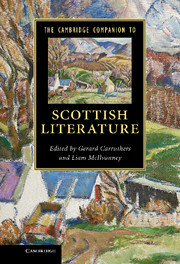Book contents
- Frontmatter
- Contents
- Notes on Contributors
- Acknowledgements
- Chronology
- Introduction
- 1 Scottish Literature before Scottish Literature
- 2 The Medieval Period
- 3 Reformation and Renaissance
- 4 The Aftermath of Union
- 5 Robert Burns
- 6 Enlightenment, Romanticism and the Scottish Canon
- 7 Scott and the Historical Novel
- 8 The Gaelic Tradition
- 9 Scottish Gothic
- 10 Victorian Scottish Literature
- 11 Robert Louis Stevenson
- 12 Hugh MacDiarmid and the Scottish Renaissance
- 13 Popular Fiction
- 14 Muriel Spark
- 15 The Glasgow Novel
- 16 ‘What is the language using us for?’
- 17 The Emergence of Scottish Studies
- 18 Otherworlds
- 19 Scottish Literature in Diaspora
- Index
- References
17 - The Emergence of Scottish Studies
Published online by Cambridge University Press: 05 January 2013
- Frontmatter
- Contents
- Notes on Contributors
- Acknowledgements
- Chronology
- Introduction
- 1 Scottish Literature before Scottish Literature
- 2 The Medieval Period
- 3 Reformation and Renaissance
- 4 The Aftermath of Union
- 5 Robert Burns
- 6 Enlightenment, Romanticism and the Scottish Canon
- 7 Scott and the Historical Novel
- 8 The Gaelic Tradition
- 9 Scottish Gothic
- 10 Victorian Scottish Literature
- 11 Robert Louis Stevenson
- 12 Hugh MacDiarmid and the Scottish Renaissance
- 13 Popular Fiction
- 14 Muriel Spark
- 15 The Glasgow Novel
- 16 ‘What is the language using us for?’
- 17 The Emergence of Scottish Studies
- 18 Otherworlds
- 19 Scottish Literature in Diaspora
- Index
- References
Summary
Analyses of origin are always complex – or, as Edward Said would have it, ‘beginnings’ are always ‘uncanny’, or unsettling. For one thing, their object is multiple: to recount the rise of Scottish Studies, for example, one must also account for the field’s prehistory – what was there before it developed into its modern, recognisable form. Then there are questions of territory, that is, of the place of individual works within the field and of the field itself relative to some larger academic terrain. And in the case of Scottish Studies in particular, this generic complexity is compounded by the extent that the discipline involves a nation composed of multiple languages and cultures, an ambiguous relation to conventional statehood and a significantly diasporic history.
Hence, to discuss the rise of Scottish Studies is to evoke a great many things besides, so that no short essay can do the subject justice. Of course, to some extent, the field is a monument to the purported injustice it has perpetually done itself – or so it would appear from a certain branch of its history. In 1919, G. Gregory Smith observed that Scotland’s relatively small size and coherent languages should lend themselves to ‘a general estimate’ of the nation’s literature. However, he continued, close engagement of the material reveals contrary propensities toward realism and fantasy which, ‘under the stress of foreign influence and native division and reaction’, spawn ‘a zigzag of contradictions’. But then, in a gesture befitting Hegel or Renan, or perhaps Blake, Smith unified these contraries under a banner he labelled the ‘Caledonian Antisyzygy’, a portrait of the national spirit as Jekyll and Hyde.
- Type
- Chapter
- Information
- The Cambridge Companion to Scottish Literature , pp. 248 - 260Publisher: Cambridge University PressPrint publication year: 2012



